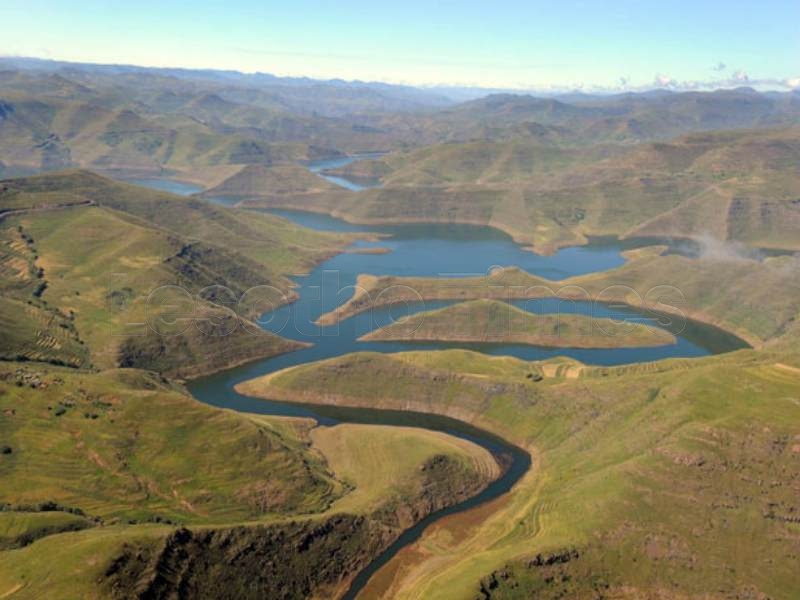THE Lesotho Highlands Water Project (LHWP) area is nested within the Maloti Drakensberg Mountain range renowned regionally and internationally for its rich biodiversity and important alpine wetland systems that supply an abundance of good-quality water.
The narrow and deeply incised nature of the Lesotho highlands topography provides an ideal environment for damming and bulk water storage reservoirs, out of which the LHWP dams were borne.
The habitat modification associated with large reservoirs inundation however have potential to threaten the rich biodiversity of the area, notably the birds.
The Bearded Vulture (BV), and Southern Bald Ibis (SBI) are some of the birds that nest and forage in the Polihali catchment as they use the slopes and cliff-lines of the escarpment edge for nesting and/or foraging.
The Bearded Vulture, known for its rich rusty-orange and black plumage, and distinctive red-ringed eyes and black facial markings, is a monogamous bird with defensive territorial behaviour.
Availability of food is crucial for its reproductive success, and during breeding (June to November), the male and female of the breeding pair share the egg incubation responsibility, and sadly only one egg usually survives.
On the other hand, the Southern Bald Ibis, recognized by its distinctive bald head and long, slender bill has a nomadic behaviour and often moves in search of suitable foraging grounds.
The Southern Bald Iroosts in trees and cliffs and utilises quite a diverse habitat. Known as ‘Mokhotlo’ in Sesotho, it is evident that the Mokhotlong District is its historic and possibly current stronghold.
The Polihali Dam area has the biggest population of Bearded Vulture and Southern Bald Ibis.
Some of these birds’ nests or colonies will potentially be affected by the construction activities or the eventual Polihali reservoir inundation.
Other threats in the catchment include predation by mammalian species and other birds’ preying on chicks as well as malicious killing by herders or traditional healers for medicine.
As part of its obligation to implement environmental management plans to mitigate project impacts on the species, the Lesotho Highlands Development Authority (LHDA) is undertaking comprehensive surveys to study the birds’ behaviour, distribution, and conservation status in the Polihali and Katse catchments as well as other catchments outside the LHWP area.
“Understanding the specific ecological requirements of each species is integral to developing its effective conservation strategies,” Mr Lebamang Mabari, the Range Management Officer at Polihali said.
At the national level, Lesotho and South Africa have partnered on several initiatives to implement the conservation action plans for the birds that traverse the highlands as their habitats are not confined to the political boundaries.
LHDA is part of the bilateral Bearded Vulture Task Force (BVTF) that is coordinated by the Department of Environment in Lesotho, and the Ezemvelo KwaZulu Natal Wildlife in South Africa. Other partners comprise the relevant government departments from both countries and entities such as the Lesotho Electricity Company that have a stake in the conservation of birds.
The BVTF has pioneered a BV captive breeding programme that entails harvesting of one egg from the BV nests in Lesotho and RSA and hatching them in incubators in a captive breeding facility in Pietermaritzburg, South Africa.
Captive chicks are raised in a protected environment in preparation for their release back into the wild at an appropriate time.
This is done to ensure breeding success and augment the wild population that are under threat from multiple factors.
The Wildlife Act, supported by the LHDA has also pioneered a BV feeding programme in Mokhotlong in 2023 through establishment of a ‘vulture restaurant’ at the Molumong village. This is a designated feeding area, where pre-cut bones and meat are placed regularly to feed the birds. This feeding program is important because availability of food is key for successful breeding in vultures.
Similarly, the LHDA implements collaborative activities with Bird Life South Africa that are geared towards conservation of the Southern Bald Ibis species. In this regard, monitoring is also key, and in addition to annual ground monitoring, satellite tracking devices have been fitted on some birds from the Masakong Southern Bald Ibis colony whose nesting site will be inundated by the Polihali reservoir.
This is done to remotely monitor movement of the birds and to ensure the safe relocation of the colony due to construction disturbance or post inundation of the dam.
One of the LHDA milestones in birds’ conservation happened in March 2023, where the LHDA undertook an inaugural Lesotho Atlas Bash in the Mokhotlong District. The bash brought together a team of birding experts from RSA who worked with the LHDA and BirdLife South Africa to collect the species distribution data in the Polihali catchment.
“It is our overall mandate as the LHDA to implement the LHWP in a sustainable manner which protects the communities, biodiversity and the environment,” Mrs Monongoaha, the LHDA Environment Branch Manager said.
“That is why the project has invested heavily in environmental baseline studies, impact assessments and implementing mitigation measures thereof.
“We are hopeful that with the local and bilateral partnerships, as well as the communities in our catchment areas, we will be able to create a healthy environment for the important bird species of the Lesotho highlands, especially those identified as threatened.”
She said communities are encouraged to collaborate with the LHDA and partners in supporting conservation programmes to ensure that these remarkable species continue to grace the skies of Southern Africa for generations to come.

